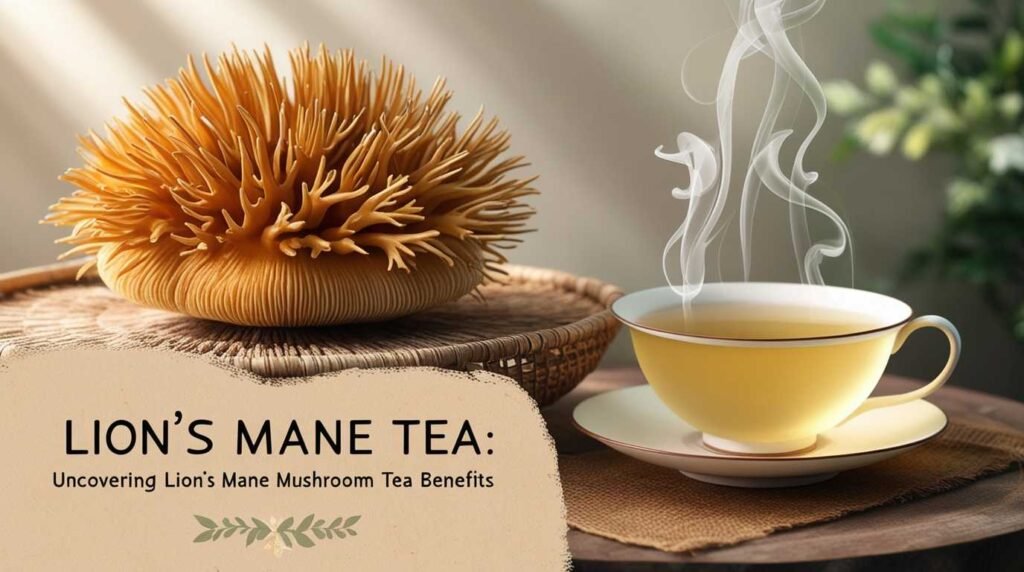Lion’s Mane Tea: Uncovering Lion’s Mane Mushroom Tea Benefits

If you’re a tea fan and looking to boost your brain power, Lion’s Mane tea might be the secret weapon you’ve been searching for. Packed with various health benefits beyond improving cognitive function, this magical brew is quickly gaining popularity among health enthusiasts. Join us as we uncover the many wonders of Lion’s Mane mushroom tea and how it can supercharge your overall well-being like never before.
- Introduction to Lion's Mane Mushroom Tea
- What Are Lion's Mane Mushrooms?
- Health Benefits of Lion's Mane MushorTea
- How to Make Lion's Mane Tea: A Step-by-Step Guide
- Delicious Recipes Featuring Lion's Mane Tea
- How to Incorporate Lion's Mane Mushrooms
- Lion's Mane Mushroom Side Effects
- Lion's Mane Mushroom Tea FAQs
- Final Thoughts
Introduction to Lion’s Mane Mushroom Tea
Lion’s Mane mushroom, also known as Hericium erinaceus, is a medicinal mushroom used for centuries in traditional Chinese medicine. It is named after its distinctive appearance, resembling the lion’s Mane. This powerful fungus has numerous health benefits. Recently, It has gained popularity as an alternative remedy for various health conditions.
From Asia, Lion’s Mane mushrooms grow on hardwood trees and have been used in traditional Eastern medicine for their cognitive-enhancing properties. However, it was not until recently that its potential as a beverage emerged through the creation of Lion’s Mane tea. Lion’s Mane mushrooms have a mild, slightly savory flavor, and their tender, meaty texture makes them a versatile addition to various dishes.
This tea’s rich concentration of active compounds, such as beta-glucans, hericerins, and erinacines, make it unique. Research has shown that these compounds exhibit anti-inflammatory, antioxidant, and neuroprotective effects. In addition to these bioactive components, Lion’s Mane also contains essential vitamins and minerals like vitamin B6, potassium, magnesium, and phosphorus.
The preparation process of the tea involves brewing dried or powdered Lion’s Mane mushrooms in hot water for several minutes. The resulting brew has a mild earthy flavor with subtle hints of sweetness and a slight bitterness.
What Are Lion’s Mane Mushrooms?
These unique mushrooms get their name from their fuzzy appearance, resembling the Mane of a lion. Native to Asia, particularly China, Japan, and Korea, lion’s mane mushrooms have been used in traditional medicine for centuries.
Characteristics
- Appearance: The fruiting bodies of lion’s mane mushrooms are composed of long, hairy, white tendrils that hang down from a central point. They resemble a cascading waterfall of icicles.
- Taste: Lion’s mane mushrooms have a mild flavor, often described as being similar to seafood or lobster. When prepared, their texture turns tender with a slight chewiness.
Nutritional Components
- Protein: Lion’s mane mushrooms are a rich source of protein, containing all the essential amino acids the body needs.
- Beta-Glucans: These bioactive compounds found in lion’s mane mushrooms support immune function and have potential anti-cancer properties.
- Antioxidants: Lion’s mane mushrooms contain antioxidants, such as phenols and polysaccharides, which help protect the body against oxidative stress and free radicals.
- Vitamins and Minerals: They provide essential vitamins and minerals, including B vitamins, potassium, and zinc, contributing to overall health and well-being.
Including lion’s mane mushrooms in your diet can be a delicious and nutritious way to support your overall health and well-being. You can find lion’s mane mushrooms in various forms, including fresh, dried, or as dietary supplements such as powders, extracts, and teas. Consult a healthcare professional or a qualified practitioner to determine the appropriate dosage and usage guidelines based on your specific health needs.
Health Benefits of Lion’s Mane MushorTea
For centuries, Lion’s Mane mushrooms have been utilized in traditional Chinese and Japanese medicine due to their numerous health benefits. This unique mushroom is delicious and offers numerous advantages when consumed as a tea. From boosting the immune system to improving cognitive function, here are some of the top health benefits of Lion’s Mane tea:
Improved Cognitive Function
Lion’s Mane tea has been praised for its numerous health benefits, including its ability to improve cognitive function. This powerful beverage has been used for centuries in traditional Chinese medicine. It is now gaining widespread recognition for its potential to enhance brain health.
Lion’s Mane tea is believed to boost cognitive function because of its high content of a compound called hericenones. These compounds have been shown to stimulate the growth of nerve cells in the brain, which can help improve memory, focus, and overall brain function. Additionally, Lion’s Mane contains other active ingredients, such as erinacines and beta-glucans, that have neuroprotective properties.
Studies have also shown that Lion’s Mane mushroom tea may benefit individuals with age-related cognitive decline. Our brains naturally deteriorate as we age, leading to memory loss and decreased mental function. However, drinking Lion’s Mane tea regularly may slow down this process by stimulating the production of nerve growth factors (NGFs) in the brain. NGFs are essential proteins crucial in maintaining healthy neurons and promoting their longevity.
Furthermore, Lion’s Mane mushroom tea has been found to increase acetylcholine levels in the brain. Acetylcholine is a neurotransmitter responsible for many important functions, such as memory formation, learning, and muscle movement. By boosting acetylcholine levels, Lion’s Mane helps support healthy communication between neurons and promotes better overall brain function.
In addition to improving cognitive performance in older adults, Lion’s Mane tea may benefit younger individuals by enhancing their ability to learn and retain information. A study conducted on college students showed that those who consumed Lion’s Mane extract had significantly higher scores on a visual recognition test compared to those who did not drink it.
It is worth noting that while research on the effects of Lion’s Mane on human cognition is still relatively limited, animal studies have yielded promising results. For example, a study on mice found that those given Lion’s mane extracts showed improved spatial learning and memory compared to the control group.
Lion’s Mane tea is an all-natural and delicious way to improve cognitive function. Its powerful compounds stimulate brain cell growth, increase levels of important neurotransmitters, and may even slow down age-related decline. Why not incorporate this ancient remedy into your daily routine for a sharper mind and better overall brain health?
Reduced Inflammation
One of the many benefits of this unique tea is its ability to reduce inflammation. Inflammation is a natural immune response that helps our bodies fight infections and heal injuries. However, chronic or excessive inflammation can have negative effects on our health, leading to conditions such as arthritis, heart disease, and even cancer. Minimizing inflammation is essential for supporting overall health.
Research has shown that Lion’s Mane tea contains polysaccharides with potent anti-inflammatory properties. These compounds function by blocking the production of pro-inflammatory molecules in the body while encouraging the release of anti-inflammatory cytokines. As a result, drinking Lion’s Mane tea regularly can help reduce chronic inflammation and lower the risk of developing inflammatory diseases.
Moreover, studies have also shown that Lion’s Mane tea may benefit those suffering from specific inflammatory conditions such as rheumatoid arthritis (RA), an autoimmune disorder that causes joint inflammation. A study on animals found that extracts from lion’s mane mushrooms significantly reduced swelling and pain associated with RA.
Aside from its direct effect on reducing inflammation levels, Lion’s Mane tea may also indirectly contribute to lowered inflammation through its impact on gut health. The gut microbiome is crucial in regulating immune responses and controlling inflammation levels. Research has suggested that consuming lion’s mane mushrooms may promote healthy gut bacteria growth, which could ultimately lead to reduced levels of systemic inflammation.
Incorporating Lion’s Mane mushrooms into your daily routine can provide numerous health benefits, including reduced inflammation. Its anti-inflammatory properties make it an ideal natural remedy for managing various inflammatory conditions and promoting overall well-being. So why not brew yourself this strong tea and harness its many benefits today?
Boosted Immune System
Lion’s Mane tea has been used for centuries in traditional Asian medicine to boost the immune system and promote overall health and wellness. This powerful medicinal mushroom contains a unique compound combination that significantly affects the immune system.
One of the key components of Lion’s Mane mushroom is beta-glucans, a type of polysaccharide extensively studied for its immunomodulatory properties. These compounds have been found to activate macrophages, which are specialized immune cells responsible for engulfing and destroying harmful pathogens. By activating these cells, Lion’s Mane tea helps to strengthen the body’s first line of defense against infections.
In addition, beta-glucans stimulate the production of antibodies by B cells, another type of immune cell crucial for fighting infections. Lion’s Mane tea is an excellent choice for those looking to boost their immunity during cold and flu season or when recovering from an illness.
Furthermore, Lion’s Mane tea contains high levels of antioxidants, which can help protect the body against oxidative stress caused by free radicals. Free radicals are unstable molecules that can damage cells and contribute to cancer and heart disease. By neutralizing these harmful molecules, antioxidants in Lion’s Mane tea help support a healthy immune system.
Lion’s Mane tea may benefit the immune system through its anti-inflammatory properties. Long-term inflammation has been associated with a variety of health issues, including autoimmune diseases. Studies have shown that Lion’s Mane extract can reduce markers of inflammation in the body, potentially helping to prevent or manage these conditions.
Incorporating Lion’s Mane tea into your daily routine can provide a powerful boost to your immune system. Its unique compound combination helps activate and support various immune system components, making it an excellent choice for those looking to maintain optimal health and well-being. So why not try this potent medicinal mushroom and experience the benefits yourself?
Better Digestive Health
Lion’s Mane tea has been gaining popularity for its numerous health benefits, and one of the most significant advantages it offers is improved digestive health. This powerful brew has been used for centuries in traditional medicine to treat various digestive issues, and modern research has confirmed its effectiveness.
One of the primary reasons for Lion’s Mane tea’s ability to promote better digestive health is its anti-inflammatory properties. Inflammation in the digestive tract can lead to discomfort, bloating, and even serious conditions like irritable bowel syndrome (IBS) or Crohn’s disease. Studies have shown that Lion’s Mane contains compounds that can inhibit inflammation and protect the stomach lining from damage caused by harmful bacteria.
Furthermore, this medicinal mushroom also acts as a prebiotic, nourishing beneficial gut bacteria. Beneficial bacteria in the gut are essential for a healthy digestive system, supporting both digestion and nutrient absorption. Lion’s Mane tea helps maintain a balanced microbiome by promoting the growth of these beneficial microbes. It helps to prevent problems such as constipation, diarrhea, and abdominal discomfort.
Another way Lion’s Mane tea promotes better digestive health is by enhancing intestinal motility. This refers to the contraction and relaxation movements of the muscles in the intestines that push food along the digestive tract. Slow intestinal motility can lead to constipation and other uncomfortable symptoms. Research has shown that regular Lion’s Mane tea consumption can improve intestinal motility, thus alleviating constipation and promoting smoother bowel movements.
In addition to improving overall digestion, Lion’s Mane mushrooms may relieve specific digestive conditions such as ulcers or gastritis. These conditions are often caused by an imbalance in stomach acid levels or damage to the protective mucus layer in the stomach lining. The anti-inflammatory properties of Lion’s Mane help reduce inflammation in these areas while stimulating mucous production and increasing stomach acidity—all essential factors for treating ulcers effectively.
Lion’s Mane tea has been found to positively impact mental health and is closely linked to digestive health. Stress and anxiety can upset the balance of gut bacteria, which may result in digestive problems. The compounds in Lion’s Mane tea have been shown to promote relaxation and reduce stress levels, ultimately contributing to better overall digestion.
Adding Lion’s Mane mushroom tea to your daily routine can greatly support digestive health. Its anti-inflammatory properties, prebiotic effects, promotion of intestinal motility, and potential treatment for specific digestive conditions make this medicinal mushroom an excellent addition to any diet. So why swap out your regular cup of tea or coffee for a soothing and beneficial Lion’s Mane tea today? Your digestive system will thank you.
Enhanced Mood and Stress Relief
Lion’s Mane tea is known for its numerous health benefits, one of the most prominent being its ability to enhance mood and relieve stress. This unique mushroom tea has been used in traditional Chinese medicine for centuries, and modern research has shown that it contains compounds that can positively impact mental health.
Another way this mushroom tea can relieve stress is by balancing cortisol levels. Cortisol, commonly known as the “stress hormone,” is released in response to physical or emotional stress. While cortisol serves an important purpose in our bodies’ fight-or-flight response, prolonged high levels of this hormone can lead to negative effects on our mental health. Lion’s Mane tea helps regulate cortisol levels, thereby reducing feelings of stress and anxiety.
Furthermore, many people who struggle with mood disorders also have trouble getting quality sleep. Lion’s Mane tea has been found to improve sleep quality and promote relaxation, which can contribute to an overall improvement in mood.
Lion’s Mane tea has proven to be a powerful natural remedy for enhancing mood and relieving stress. Its ability to increase NGF production, reduce inflammation, balance cortisol levels, and improve sleep quality makes it an effective tool for managing mental health issues. Incorporating this mushroom tea into your daily routine may help you experience a more positive outlook and better manage stress levels.
Remember, managing anxiety and depression requires a holistic approach that may include therapy, self-care practices, and a healthy lifestyle. Lion’s mane mushrooms can be a complementary component in supporting overall mental well-being.
Supporting Nerve Regeneration
One of the most unique aspects of the Lion’s Mane mushroom is its ability to stimulate nerve growth factor (NGF) production in the body. NGF plays a vital role in maintaining healthy nerve function and promoting nerve regeneration, which is particularly beneficial in nerve damage or neurological injuries. Studies indicate that the bioactive compounds in these mushrooms promote myelin production and accelerate nerve growth, supporting the repair and recovery of the nervous system. By supporting proper nerve function, NGF helps regulate communication between different systems in the body, including our immune response.
Improves Heart Health
This superfood contains antioxidants that may benefit heart health by preventing damage caused by free radicals, contributing to heart disease. Additionally, studies have found that Lion’s Mane tea can lower LDL (bad) cholesterol levels and increase HDL (good) cholesterol, promoting a healthy heart.
Managing Diabetes
Lion’s mane mushrooms may offer potential benefits for individuals with diabetes by impacting blood sugar levels. Here’s what you need to know about how lion’s mane mushrooms can help manage diabetes.
Studies indicate that Lion’s Mane mushrooms may assist in regulating blood sugar levels. A study published in the International Journal of Medicinal Mushrooms found that lion’s mane extract lowered blood glucose levels in diabetic mice. Another animal study published in the Journal of Agricultural and Food Chemistry showed that lion’s mane extract reduced blood sugar levels and improved insulin resistance.
Studies indicate that lion’s mane mushrooms could enhance insulin sensitivity, improving glucose control. An animal study published in PLoS One demonstrated that lion’s mane extract improved insulin sensitivity and decreased blood glucose levels in rats.
Keep in mind that effective diabetes management requires a holistic approach, including medication, a balanced diet, physical activity, and consistent monitoring. Lion’s mane mushrooms should not be a substitute for conventional medical treatments but rather a potential complementary option to support overall diabetes management. Continue to prioritize a healthy lifestyle and work closely with your healthcare team to determine the most appropriate strategies to manage your diabetes effectively.
Promotes Hair & Skin Health
Lion’s Mane contains high levels of antioxidants, which can help protect the body’s cells from damage caused by environmental factors such as UV rays. Consuming this tea may promote healthy hair and skin by preventing premature aging.
Incorporating Lion’s Mane tea into your daily routine can provide numerous health benefits. Still, it is essential to remember that it should not be used as a replacement for medical treatment. It is recommended to consult with your healthcare provider before incorporating new herbal teas into your diet. So why wait? Brew yourself a cup of Lion’s Mane tea and experience its powerful effects on your mind and body.
How to Make Lion’s Mane Tea: A Step-by-Step Guide
Making lion’s mane tea at home is a simple and enjoyable process that allows you to experience all its health benefits in the comfort of your home. Here is a step-by-step guide with photos to help you incorporate this powerful tea into your daily routine.
Step 1: Gather Your Ingredients
The first step in making lion’s mane tea is gathering all the necessary ingredients. These include dried lion’s mane mushrooms, water, and any additional flavors or sweeteners you may desire. Dried lion’s mane mushrooms can be found at most health food stores or online.
Step 2: Prepare the Mushrooms
Before brewing your tea, it is important to prepare the mushrooms properly. To ensure cleanliness, please wash them thoroughly under cold water, removing any dirt or debris. Next, using a sharp knife, cut the mushrooms into small pieces. This will allow for better nutrients to be extracted during the brewing process.
Step 3: Boil Water
Once your mushrooms are prepared, boil water on the stovetop.
Step 4: Add Mushrooms and Let Simmer
Once the water has come to a boil, add your prepared lion’s mane mushrooms and let them simmer for 10-15 minutes. This ensures optimal extraction of the mushrooms’ beneficial compounds.
Step 5: Strain and Serve
After simmering for 10-15 minutes, strain the liquid from the mushroom pieces using a filter. Pour the strained liquid into a cup and discard or save the leftover mushroom pieces for another use. You now have freshly brewed lion’s mane tea!
Optional Step: Add Flavorings or Sweeteners
While some people enjoy their lion’s mane tea plain, others prefer adding flavorings such as lemon juice or honey for added taste and health benefits.
Delicious Recipes Featuring Lion’s Mane Tea
This section will explore mouth-watering recipes featuring Lion’s Mane mushroom as the star ingredient.
1) Lion’s Mane Tea Latte
If you’re a fan of lattes, this recipe is a must-try. Use a strong brew of Lion’s Mane tea to create this rich and soothing drink. Then warm up your choice of milk (dairy or non-dairy) in a saucepan and add it to the brewed tea, along with a dash of cinnamon powder and honey for sweetness. You can also top it off with frothed milk for an extra touch of indulgence.
2) Roasted Vegetables with Lion’s Mane Tea Glaze
This savory recipe combines roasted vegetables with a tangy glaze from brewed Lion’s Mane tea, balsamic vinegar, olive oil, and garlic. The earthy notes of the mushrooms perfectly complement the balsamic vinegar’s sweetness, making this dish an explosion of flavors. It pairs well with grilled meats or can be a standalone vegetarian option.
3) Mushroom Risotto with Lion’s Mane Tea Infused Broth
Risotto lovers will appreciate the unique twist added by using Lion’s Mane tea-infused broth instead of regular vegetable or chicken broth. The delicate herbal notes from the tea enhance this classic Italian dish’s rich, umami flavors. Top it off with sautéed mushrooms for an extra boost of texture and flavor.
4) Vegan Chocolate Pudding made with Lion’s Mane Tea
Yes, you read that right – this vegan chocolate pudding recipe uses brewed Lion’s Mane tea as a base instead of milk. This adds a rich, earthy flavor and boosts antioxidants and other health benefits. Mix the tea with avocado, cocoa powder, vanilla extract, and maple syrup for sweetness, and chill in the fridge until set.
5) Lion’s Mane Tea Infused Granola
This simple yet delicious granola recipe adds some extra nutrition to your breakfast. Mix rolled oats, nuts, seeds, honey, or maple syrup (for sweetness), and brewed Lion’s Mane tea together before baking in the oven until golden brown. Enjoy it as a topping on yogurt or as a standalone snack.
How to Incorporate Lion’s Mane Mushrooms
To harness the potential benefits of lion’s mane mushrooms, you can incorporate them into your diet in various ways. They are available in fresh, dried forms, or as supplements like powders, extracts, and teas.
Adding Lion’s Mane mushrooms to your diet is straightforward. You can sauté them as a delicious addition to stir-fries, soups, or pasta dishes. Alternatively, you can consume them as tea or incorporate them into smoothies.
Lion’s Mane Supplements
When reaping the benefits of lion’s mane mushrooms, supplements provide a convenient way to incorporate this incredible fungus into your daily routine. Lion’s mane supplements offer a concentrated dose of the mushroom’s potent compounds in various forms such as powders, extracts, and teas. Let’s look at each option and explore recommended dosage and usage guidelines.
Lion’s Mane Extracts
Lion’s mane mushroom extracts are one of the most popular supplement forms. These extracts are typically derived from the mushroom’s fruiting body and undergo a careful extraction process to concentrate the beneficial compounds. One advantage of extracts is their high potency, allowing you to consume a significant amount of lion’s Mane in a small serving. Extracts are available in the form of liquid tinctures or capsules.
Recommended Dosage: The recommended dosage for lion’s mane extract supplements is typically around 500-1000mg daily. However, it’s important to follow the specific instructions provided by the manufacturer and consult with a healthcare professional if needed.
Lion’s Mane Powders
Lion’s mane powders are another popular choice, especially for those who prefer mixing mushrooms into their beverages or recipes. These powders are created by grinding dried lion’s mane mushrooms into a fine consistency. They offer versatility, allowing you to include Lion’s Mane in smoothies and coffee or sprinkle it over your meals.
Recommended Dosage: The recommended dosage for lion’s mane powder supplements is 1-3 grams daily. It’s essential to carefully measure the serving size and gradually increase it as needed.
Lion’s Mane Teas
Lion’s mane teas provide a soothing and pleasant way to enjoy the benefits of this remarkable mushroom. These teas are usually made by steeping dried or fresh lion’s mane slices in hot water. The warm brew releases the mushroom’s bioactive compounds, creating a flavorful and health-supportive beverage.
Recommended Dosage: There are no strict dosage guidelines for lion’s mane tea. You can enjoy 1-2 cups daily or adjust the frequency according to your preferences.
It’s important to note that the effectiveness of lion’s mane supplements can vary based on their quality and source. Look for reputable brands prioritizing organic cultivation and employing rigorous testing methods to ensure purity and potency. As with any supplement, it’s wise to consult a healthcare professional before incorporating Lion’s Mane into your routine, especially if you have any underlying health conditions or are taking medications.
Remember, these supplements should be taken as part of a well-balanced diet and a healthy lifestyle. They serve as supportive additions to your wellness journey, assisting you in unlocking the potential health benefits of lion’s mane mushrooms.
Lion’s Mane Mushroom Side Effects
While lion’s mane mushrooms are generally considered safe for consumption, it’s important to be aware of potential side effects and take necessary precautions. Here are some key considerations:
1. Allergic Reactions: People with mushroom allergies should be cautious when consuming Lion’s Mane mushrooms. It’s recommended to start with small amounts and closely monitor any adverse reactions.
2. Digestive Issues: Some people may experience mild gastrointestinal discomforts, such as stomach upset, diarrhea, or nausea when consuming lion’s mane mushrooms. If these symptoms continue or become more severe, it is recommended to stop using it.
3. Drug Interactions: Lion’s mane mushrooms may interact with certain medications, particularly those that affect blood clotting or the immune system. Before adding Lion’s Mane mushrooms to your routine, it is crucial to consult with a healthcare professional if you are taking any medications.
4. Pregnancy and Breastfeeding: There is insufficient research on the safety of consuming lion’s mane mushrooms during pregnancy and breastfeeding. It’s best to err on the side of caution and avoid these mushrooms or consult with a healthcare professional for guidance.
5. Quality and Source: To minimize the risk of contamination or adverse reactions, choose reputable suppliers and ensure proper storage and handling of lion’s mane mushrooms.
Remember, individual reactions may vary, and it’s always wise to consult with a healthcare professional before introducing any new supplements or dietary changes into your routine.
Lion’s Mane Mushroom Tea FAQs
What does Lion’s Mane mushroom tea do?
Lion’s Mane mushroom tea is known for its potential health benefits, particularly in supporting brain health and cognitive function. It’s believed to improve memory, enhance mental clarity, and may have neuroprotective effects. Although promising, further research is required to gain a complete understanding of its effects and advantages.
What are Lion’s Mane side effects?
Common side effects of Lion’s Mane include headaches, dizziness, and upset stomach. In rare instances, it may result in allergic reactions. It’s important to consult with a healthcare provider before starting Lion’s Mane, especially if you have any pre-existing health conditions.
Who cannot take Lion’s Mane?
People with allergies to mushrooms, those taking certain medications (like blood thinners), and individuals with liver or kidney problems should avoid Lion’s Mane. Consulting a healthcare provider is recommended for pregnant or breastfeeding women before using it.
What does Lion’s Mane mushroom do for you?
Lion’s Mane is thought to promote brain health and enhance cognitive function. It may improve memory, enhance mental clarity, and have neuroprotective effects. However, its benefits are still being studied, and more research is needed to fully understand its potential.
Is Lion’s Mane safe to take daily?
While Lion’s Mane is generally considered safe for most people, it’s important to start with a lower dose and gradually increase it. Consulting with a healthcare provider is advisable, especially for those with underlying health conditions or taking other medications.
Is Lion’s Mane a drug?
No, Lion’s Mane is not considered as a drug. It is a type of mushroom utilized in traditional medicine for centuries. Seeking advice from a healthcare provider before beginning any new supplement is always recommended.
Is Lion’s Mane illegal?
No, Lion’s Mane is not illegal. It’s a type of mushroom that can be found in nature and is used in traditional medicine.
How to Use Lion’s Mane?
Lion’s Mane is available in different forms, such as tea, capsules, and powder. The recommended dosage varies, but it’s generally safe to start with a lower dose and gradually increase it. Always follow the instructions on the product or consult with a healthcare provider.
Lion’s Mane Dosage?
The dosage of Lion’s Mane can vary depending on the form (tea, capsules, powder) and the individual’s health status. Starting with a low dose and gradually increasing it, with guidance from a healthcare provider, is important.
What to Look for When Purchasing Lion’s Mane?
When purchasing Lion’s Mane, look for products that are certified organic or made from wild-caught mushrooms. It’s also important to check the dosage and follow the instructions provided by the manufacturer. It is always recommended to consult with a healthcare provider prior to starting any new supplement.
Final Thoughts
Lion’s mane tea is a delicious and easy way to incorporate this powerful mushroom into your daily routine. With its many health benefits, including improved cognitive function and reduced inflammation, it’s no wonder that it has gained popularity in recent years. By following these simple steps and using quality ingredients, you can enjoy the full potential of lion’s mane mushroom tea.
While studies of lion’s mane mushrooms have shown promising results, more research is needed to understand their potential benefits fully. As with any supplement or dietary change, consult with your healthcare provider before incorporating lion’s mane mushrooms into your routine.
Always prioritize quality, reliability, and safety when purchasing lion’s mane mushroom products. Enjoy the potential health benefits and be mindful of individual sensitivities or allergies.






